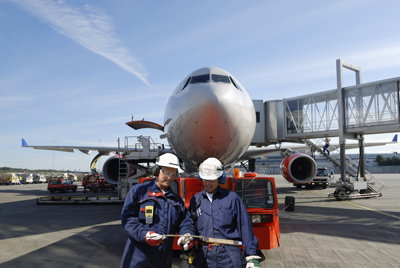 As the demand for air travel keeps rising, the majority of experts agree that the future of the industry is looking bright. It is forecasted that by 2016 aviation will have injected more than $ 1 trillion into the global economy and created (directly and indirectly) almost 70 million jobs worldwide. Ironically, as concerns qualified workforce, ensuring safety of operations with the constantly growing global fleet still remains a headache for the respective players.
As the demand for air travel keeps rising, the majority of experts agree that the future of the industry is looking bright. It is forecasted that by 2016 aviation will have injected more than $ 1 trillion into the global economy and created (directly and indirectly) almost 70 million jobs worldwide. Ironically, as concerns qualified workforce, ensuring safety of operations with the constantly growing global fleet still remains a headache for the respective players.
Aviation industry is a vital driver of the global economy, generating billions of dollars in revenue, providing employment, bolstering economic growth and improving the quality of people’s lives. However, maintaining a safe and robust aviation system requires a sufficient number of qualified aviation professionals to design, manufacture and repair, as well as ensure the airworthiness of more than 20 000 aircraft used in commercial aviation at the moment.
At the same time, figures released by the UK CAA show that despite the significantly expanding local fleet, the number of aircraft engineers in the country has actually halved during the past 30 years. Similar trends have been also witnessed in other major aviation countries. Although this drop in engineering manpower has, to a degree, been alleviated by investment into new aircraft (which need less maintenance in the early years of their life), it has already led to an apparent shortage of aerospace engineers. Furthermore, the gap is only expected to become increasingly wider.
“Aviation maintenance engineers work in an exciting and prestigious industry. Moreover, the specialists enjoy much higher salaries than technical personnel in most other  industries. The annual pay for an aviation engineer ranges anywhere between $50 000 and $90 000, depending on qualification. Nevertheless, the industry and governments, although being well aware of the rapidly approaching skills shortage, have generally failed to respond by launching any real initiatives to counter the worrying trend. As a result, the existing efforts to attract a new younger generation of professionals to the aviation engineering segment sadly remain few and far between,” shares Skaiste Knyzaite, the CEO of AviationCV.com
industries. The annual pay for an aviation engineer ranges anywhere between $50 000 and $90 000, depending on qualification. Nevertheless, the industry and governments, although being well aware of the rapidly approaching skills shortage, have generally failed to respond by launching any real initiatives to counter the worrying trend. As a result, the existing efforts to attract a new younger generation of professionals to the aviation engineering segment sadly remain few and far between,” shares Skaiste Knyzaite, the CEO of AviationCV.com
Roughly 80% of the current aerospace workforce is aged 40-65. Since over the next 20 years most of these specialists are expected to retire or switch to other industries, this demanding field faces a constantly growing deficiency in supply. As a result, numerous online websites already show hundreds of open maintenance engineer positions at various airlines and MRO organizations. Therefore, it should come as no surprise that aircraft maintenance is constantly listed among top ten or top twenty best career choices on such popular websites as MonsterJobs, Yahoo! Jobs, and Forbes. One large online aviation employment board operator has recently reported that the most demanded people in the corporate aviation sector are maintenance technicians and engineers. They account for 30% of expected hiring, whereas pilots represent only 7.5%.
“Apart from being particularly well-paid and rewarding, the profession offers a high degree of flexibility few other jobs can provide. For instance, subject to enough experience, there is always an opportunity to transfer into one of the many related areas, such as technical sales, maintenance team management or contract management, so there’s plenty of room to grow. Unfortunately, most aviation HR managers know that more often than not qualified people are simply not available,” shares Skaiste Knyzaite, the CEO of AviationCV.com. “At the same time, with the industry booming, it will not be possible to maintain the required high levels of safety without a corresponding increase in qualified workforce to support the expanding fleet. Industry players must therefore focus on making respective career opportunities more attractive to the younger generation, and start planning for the future today.”





